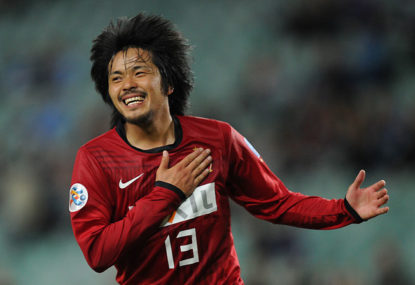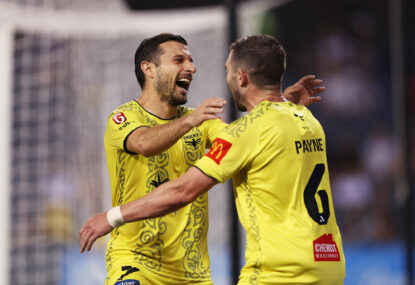Australian football coaches are flocking to Asia for opportunity, experience and the promise of the almighty dollar.
With only 10 A-League jobs, plus a handful of opportunities with national junior and senior teams, professional coaching positions in Australia are extremely limited. Asia provides an array of scope for the coach willing to travel and test themselves.
It can be the perfect spot for a young coach to learn his trade, or alternatively, the right place for an older coach to find success and monetary advantages.
Graham Arnold is one coach who is chancing his arm and now challenging himself in Japan, which could present a pathway into coaching in Europe. Aussie coaches might be rare in the J-League but they are common across other parts of Asia.
In Singapore, former Socceroo Darren Stewart manages Woodlands Wellington FC and has won a coach of the year gong. In Malaysia, ex-Socceroos Mehmet Durakovic and David Mitchell manage Selangor FA and Kedah FA respectively, while Phil Stubbins is in charge of second-division Thai side Ayutthaya FC.
Arthur Papas is in India, where he leads one of the country’s biggest professional teams in Dempo SC and continues taking on the experience with relish.
“My time in India has been one that has allowed me to improve my overall knowledge, increase my ability to adapt and in particular become sharper dealing with match situations,” Papas says.
“This comes about from coaching against opposition coaches from different continents in the league or against other countries in a tournament who all have their particular styles. It forces you to deal with situations you will not confront in Australia, so I can only see positives in this experience up until now.
“From the moment I began coaching I have placed a high emphasis on receiving a thorough education,” Papas continues, “and by placing myself in situations that are uncomfortable I have consistently tested my resolve and commitment to my profession because you need to have thick skin and self-belief to pursue a career in coaching.”
As is often the case in Asia, coaching the team is not the only requirement of the role. Dealing with cultural differences, language barriers, long travel times and other factors can be a challenge.
“Challenges are here every day,” Papas says. “Living and adapting to the culture is where the initial challenge begins, because you can not move forward in your profession when you are unsettled personally and it really requires a strong mentality to manage this aspect in a country such as India.
“Without a doubt it’s one of the main reasons many players and coaches do not succeed or are able to remain in parts of Asia even though they arrive with impressive CVs. It is the mindset to adapt and accept the cultural differences that is underestimated, and this is the first challenge and most important to overcome.”
Another young Australian coach gaining experience in Asia is Andrew Oakley, currently the under-19s coach for Chiang Mai FC.
“I enjoy working in Thailand,” Oakley says. “The challenge of trying to translate the football I know into a new culture and language has stretched me and I’ve loved the challenge.
“I also really love the players I get to work with. Whether they have to wait while I am translated or struggle through my bad Thai, I have been lucky to work with groups of players who really want to get better.
“I’m regularly amazed by how little they take advantage of my struggles with the language. There are also a lot of strongly held assumptions here about what Thai players can and can’t do. I don’t buy most of them and have loved watching players respond positively to being pushed beyond those assumptions.”
Oakley’s move to Thailand was inspired not just by the challenge, but the sense he had something to offer the local football community.
“I looked at the current development situation and felt that my skills and personality dovetailed in well with the current needs, particularly in developing home-grown players for a club,” he says.
“I’ve been involved in small-scale community and sport projects in Thailand and other countries in the regions for many years and my current roles mostly grew out of them. In fact, it was a period as player-coach of an Indian state league team more than six years ago that led most directly to my current role, so it’s funny how things work out.”
Oakley believes the biggest difference between Thailand football and that in Australia is the level of interference in coaching matters from club boards.
“There is very rarely anything subtle about how involved they want to be,” he says. “From sitting on the bench to instructing players to warm up with or without the coaches knowledge to even putting together a list of ‘eligible’ players to pick from for the game, the board and president are rarely far from the team.
“I was shocked the first time I saw the club president join the team huddle right before kick-off and start giving last minute instructions, but now I’ve seen it happen so often I just become used to it.
“Similarly surprising was the first time I saw a trophy presentation. Only once all the Board had had all the necessary photos were the players allowed near the trophy.”
Papas has found the differing levels of professionalism in Asian football something that has been an obstacle.
“Over here you are not afforded the comforts that you would receive working in the A-League,” he says. “Areas surrounding the infrastructure, facilities, and overall approach to professionalism are varying and to find a positive to this is difficult at times.
“So I consider this a continuation of my PHD in coaching, because it has forced me to delve into areas that I would never have to back home regarding the overall organisation of a club and how to implement a club model which will continue to assist my club and my own coaching for the future.”
Ron Smith knows more than most about the pitfalls of coaching in Asia. The former head of the AIS has spent considerable time in Malaysia and just recently ended a three-month stint in charge of Pahang FA.
Smith says interference from owners and club boards to coaches is not an across the board thing, but dependent on the country, the league and the club.
“If people are going to coach in these countries they need to understand a little bit about Asian culture and what it’s like, how you deal with people and what the expectations are for foreigners coming in as players and coaches,” he says.
Smith has coached around the world and feels that the financial advantages of coaching in Asia are hard to ignore, as are the positives of being fully immersed in a true football culture. He also believes managing a team in the region is not a step down compared to Europe.
“One of the reasons I accepted the position in Malaysia, was that a) I wanted to coach, and b) it was also they offered me a lot of money to do it,” Smith says.
“The thought that working in Asia is somewhere below working in Europe – there are coaches earning more money in Asia now then they would earn in Europe, and considerably in some cases.
“Anywhere in Asia represents an opportunity. And as football develops, more and more coaches are going to be seen going to Asia. I mean it’s a good place to work. It’s a great atmosphere and great environment and it’s rewarding.”
Both Oakley and Papas agree that aspiring Aussie coaches often have little choice but to head overseas in search of an opportunity.
“There are limited opportunities in Australia, so plenty of players and coaches have to move to find work,” Oakley says. “While those who can are still heading for Europe or at least the bigger Asian leagues, for lots of guys, whether players or coaches, it’s mostly about that chance to work full time in football and they’ll take that wherever they can get it.
“For most people who really love working in football, getting treated like a professional means a lot, and it’s nice to only have to do one job to pay the rent.”
On top of the personal and professional gains for Australian coaches, Australian football can collectively take a lot from their experiences.
As Australia is a member of the Asian confederation, and our A-League sides face Asian sides in the Asian Champions League, greater knowledge of Asian football at all levels can only be a good thing.
“It is imperative to learn more and more as a country about the evolution of football in Asia,” Papas believes. “From my time here I genuinely feel it will become increasingly difficult to navigate though Asia at any international age level, and this is already prevalent considering the results of our most recent youth teams.
“Over here football is the only pathway for many young talents and it is a desperation and ambition that we possibly are unable to match back home. I have had some profound experiences here where I have visited players families who I have coached to gain a real perspective of their upbringing and as a coach you only want to work harder for these type of players you coach because they give you everything.
“Not all Asian countries are the same obviously but it is foolish to ignore what’s so close to home and is also your direct opposition to qualify for every future international tournament at every level.”
With the Asian Cup less than a year away, our connection and link with Asian football needs to grow. We want to be a big player in the AFC and a consistent top-ranked nation, and to do that we need to be fully involved across the board with the continent.
Oakley believes the movement of Australian players and coaches into Asia really benefits the sport in two ways.
“Firstly, the more we engage with Asian football the better we are able to understand it, which helps us as we compete with Asian teams whether at youth, club or national team level,” he says.
“Secondly, it is providing Australia with a wider pool of coaching talent. A point is coming when Australia will be able to not just turn to the small pool of A-League coaches or former Socceroos to fill coaching roles but will have dozens of highly experienced coaches all over Asia able to return and add their expertise to developing Australian football.
“You never know where the next great Australian coach will come from.”
Follow John Davidson on Twitter: @johnnyddavidson




































































































